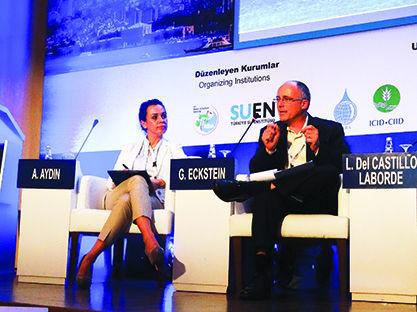Duncan Rankin, city desk writer, sits down with Texas A&M School of Law professor Gabriel Eckstein.
THE BATTALION: Could you talk about the forum you recently spoke at in Istanbul?
ECKSTEIN: I was on two panels and one that they call side session. The conference was the Istanbul Water Forum, I think it’s biennial, so every two years, and this was the third one. This time, they wanted to focus on international water law and water as a security issue. I spoke on one panel, which dealt with trans boundary waters, or you might say “shared waters,” water that crosses an international boundary, so the Rio Grande River or Colorado River for example, or even trans boundary aquifers. So that was one of the panels I spoke on. The other panel I spoke on dealt with the human right to water and sanitation.
THE BATTALION: What’s one thing Texans or citizens who share international waters should be aware of?
ECKSTEIN: Well first of all, when you’re sharing international waters it means that you’re sharing. It doesn’t mean that one country has an absolute right to that water. Even the fact that the water originates in Colorado and runs through New Mexico before it reaches the border. Under international law, the acceptable arrangement is that there is a cooperative sharing. It doesn’t mean that you’re allocating the resource 50/50. One of the general principles under international law is what is called equitable and reasonable use, so you’re using it in an equitable fashion but equitable does not mean equal. What does equitable mean? Well it could be what the parties decide what is equitable and fair, or it could be something that’s more objective. In this case we actually have a treaty, the combined treaty for the Colorado River and the Rio Grande. And they have fairly specific allocations in terms of the number of acre-feet that are supposed to be allotted for each party, Mexico and the United States. The problem with this particular arrangement is that it didn’t really take into account very well changing precipitation rates and changing climatic scenarios and so this is the situation we’re faced with. Sometimes we have drought on this side, sometimes they have drought on the Mexican side, and sometimes we both have drought. So we can’t quite always fulfill the very specific numbers and it’s a challenge.
THE BATTALION: So it’s not as cut and dry as an outside observer might think?
ECKSTEIN: No, not at all, and it never is with water. Water is so fundamental to people and to life and to communities and to society that it becomes an emotional issue, and when you don’t have it your blood pressure goes up. So the fact that you have an agreement doesn’t always help the matter, because if you don’t have water what do you have left? So it’s a very difficult situation, but this is where nations have to work together and to cooperate even when they have dwindling and reduced water resources.
THE BATTALION: Water is viewed a public good, correct?
ECKSTEIN: Well you’re right generally; internationally and in most of the country it is. I would agree that in Texas, surface water is considered state water, so theoretically the state is the trustee of that for the public. Ground water is different though; it goes by the rule of capture. The Texas Supreme Court in 2012 in the case of Edwards Aquifer v. Day kind of solidified that [the rule of capture] and said if you own the land you have a property right in the water that is underneath your land in the moment that its underneath your land. So that’s not public water, and I’m not sure that that was a great decision for Texas’ future but that’s where we are right now.
THE BATTALION: What trend do you see in Texas water? Do you see climate change having an adverse affect on the amount of fresh water that’s available for crops and human consumption?
ECKSTEIN: Do I think that climate change will have an effect? That’s beyond doubt, it already has and it will continue to. It will have an impact, absolutely, and we will have less water. Look at the Texas Water Development Board and their own projections, they won’t say ‘climate change’ in their reports but they will say ‘long term drought’ and they actually project a reduction in precipitation over the next 45 years. So they’re projecting a reduction in available water resources, I think it’s a 17 percent reduction in relation to how much we have today versus how much we’ll have in 2060, so 17 percent less water and the population is going to be about double, and that spread will get bigger and bigger as we move forward because of climate change and because of long term drought. Now, we are going to become more efficient, we just are. With technology, ingenuity, and innovation we will become more efficient with our use of fresh water. The question is whether we can keep up, that efficiency can keep up with population growth, economic needs, water for agriculture, water for municipalities, and so on. And right now even the Texas Water Development Board is projecting a problem, a serious problem, unless we make some serious changes to our management, allocation, and use of fresh water in this state.
Professor Q&A: Shared Waters
June 10, 2014

Gabriel Eckstein participates as a panelist at the Istanbul Water International Forum in Turkey.
Donate to The Battalion
Your donation will support the student journalists of Texas A&M University - College Station. Your contribution will allow us to purchase equipment and cover our annual website hosting costs.



















